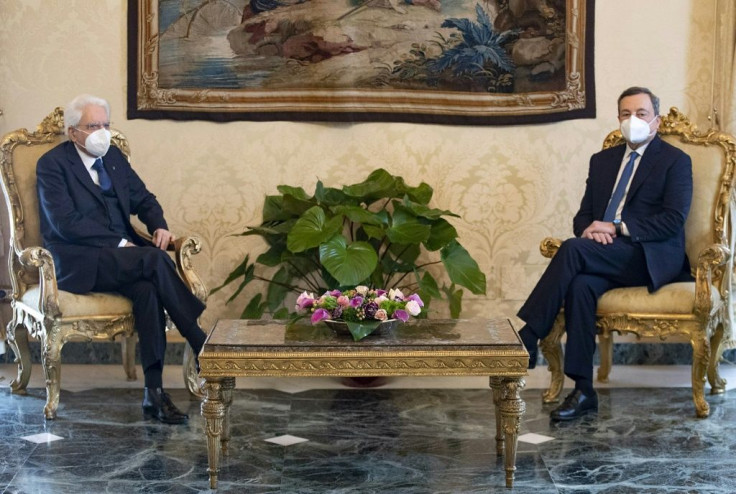Draghi Opens Talks On New Govt For Virus-hit Italy
Italy's Mario Draghi began detailed talks Thursday on the formation of a new government, the day after being parachuted in to restore political order in the virus-plagued country.
The former president of the European Central Bank (ECB) opened discussions with party leaders in Rome on whether they would support a national unity administration.
Draghi, who famously vowed to do "whatever it takes" during the 2012 eurozone debt crisis, was brought in by President Sergio Mattarella on Wednesday after the centre-left government collapsed.
He has support from some of the main parties in parliament, but the biggest -- the populist Five Star Movement (M5s) -- is not yet on board.
The economist's task is urgent. Italy remains in the grip of the deadly coronavirus pandemic, with the death toll still rising by hundreds each day, to a total of more than 90,000 so far.
Rome must also come up with a plan within weeks to boost its recession-stricken economy with the help of a massive injection of European Union funds.
In his first public remarks since being replaced, outgoing prime minister Giuseppe Conte wished Draghi well, adding: "I'll keep working for the good of the country."
He said the eurozone's third largest economy needs "a political government that is solid and sufficiently united" to tackle the challenges ahead.
Conte stepped down last week after trying in vain to keep his coalition together following the withdrawal of former premier Matteo Renzi's Italia Viva party.
Mattarella gave the ruling parties -- M5S, the centre-left Democratic Party (PD) and Italia Viva -- until Tuesday to try to patch things up, but when they failed, called in Draghi.
"Super Mario" is credited with saving the EU's single currency while head of the ECB between 2011 and 2019, but now faces an arguably tougher task.
"Despite his stature, it is not at all clear if he can win backing from a fragmented parliament that has seen two governments collapse since 2018," commented Federico Santi, senior analyst at the Eurasia group.

Draghi held talks Thursday with some of the smaller parties, and will continue having discussions on Friday and Saturday.
The PD and Renzi indicated they will back him, and Silvio Berlusconi's conservative Forza Italia said they would enter negotiations with a "very positive attitude".
But Draghi also needs the abstention or the support of one of three other parties: the M5S, Matteo Salvini's far-right League and the Brothers of Italy, also far right.
Even if it has lost most of its radical edge, the M5S started out as an anti-elitist party, so it is ideologically awkward for them to endorse an establishment figure like Draghi.
One of the M5S leaders, outgoing Foreign Minister Luigi Di Maio, echoed Conte's call for a "political government", rejecting the idea of a cabinet made up of technocrats.
Draghi could get around that by offering some cabinet posts to the M5S and other parties, but it remained unclear whether this would be enough.
There is speculation that the PD's Roberto Gualtieri could survive as economy minister, a key post as Italy draws up plans to dig itself out of the worst recession since World War II.
Italy is banking on receiving the lion's share of a European Union recovery fund -- around 200 billion euros ($240 billion) -- but must submit a credible spending plan to Brussels by April.
The Milan stock market was higher for a second day on Thursday, closing 1.65 percent up, which analysts attributed to confidence in Draghi.
"We know he'll do 'whatever it takes' to steer Italy out of its worst economic and health crisis since the war," said Markets.com analyst Neil Wilson.
Should Draghi fail to secure a majority, the fallback option would be snap elections, which a right-wing bloc led by Salvini would be favourite to win.
Mattarella said Tuesday he wants to avoid early polls, given the complexity of holding them in the middle of a pandemic.
© Copyright AFP 2024. All rights reserved.




















